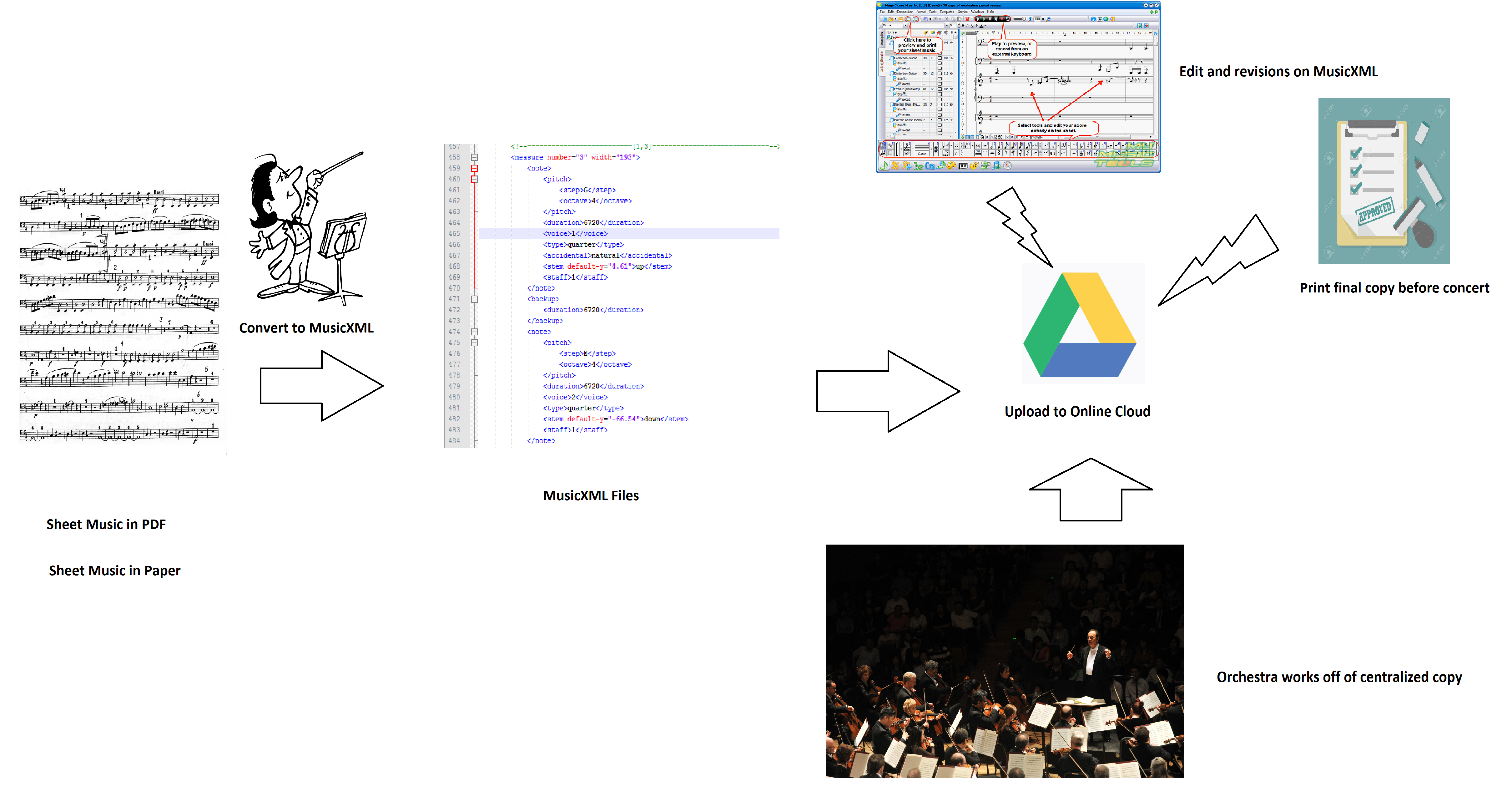Difference between revisions of "MusicXML for Efficient Rehearsals"
| Line 24: | Line 24: | ||
• Study legal issues if MusicXML files are allowed to be published online. | • Study legal issues if MusicXML files are allowed to be published online. | ||
• Provide a persuasive argument on why we should evolve our music department | • Provide a persuasive argument on why we should evolve our music department | ||
| + | |||
| + | '''Trial Run''' | ||
| + | Using Myriad PDFToMusic and Finale NotePad 2012 | ||
| + | [[File:Example.jpg]] | ||
| + | |||
'''The Sources:''' | '''The Sources:''' | ||
Revision as of 16:47, 27 April 2015
The Problem: In orchestra rehearsal, I often see my professor change a bow marking or ask us to emphasize a dynamic not written in the original piece. Only a certain number of students have a pencil to document the change. When playing, the music becomes harder to read after crossing out the arranger’s originally printed markings. There are also inconsistencies when some document the change and some do not. A section can be off by a bow marking that is visually unappealing and affects the dynamic allotted from an up bow vs a down bow. I want to research and propose a feasible way for the entire orchestra to be on the same standard for the piece. Students absent will still know the changes documented for that day. In the technology era, I find it inefficient to document changes by pen and paper when resources like the computer and internet are available.
The Plan:
It is the user’s responsibility to know the copyright laws of the piece they are modifying.
Whenever the orchestra starts a new piece, it is on paper. There is software that interpret sheet music or printed scores into editable or playable form. [1] The software is called optical music recognition software. Once captured digitally, the music can be converted to a MusicXML file. MusicXML is a markup language used to represent sheet music. Reading and writing a MusicXML file is the same thing as a HTML file.
Once the MusicXML file is read, the professor uploads the file to an online cloud (ex. Google Drive.) All members of the orchestra have access to the cloud. Now, whenever the professor wants to change a bowing, he/she opens up a MusicXML editing software like Finale, makes the edit, and pushes the change to Google Drive. It is important to also document the change for timeline reference. All members of the orchestra have the change.
When the School has enough money, tablets should be locked on music stands for electronic viewing of the most recent MusicXML file of their piece. Alternatively, the professor can print out a most recent copy for the orchestra to play.
The Technologies Available: IMSLP: for public domain music pdfs PDF/Image -> MusicXML Converter: Audiveris, Myriad MusicXML editing programs: Finale, Sibelius, MuseScore, SmartScore Online clouds: Apple cloud, WPI server, Google Drive, BlackBoard Viewing MusicXML: HTML5 canvas element and Javascript within a web browser. Examples include: installing Myriad Music Plug in, Finale Notepad The Research: This project would go under “Pedagogy, Theory, and Research Resources” on Manzo’s WPI wiki page. Throughout the weeks, I will evaluate the feasibility of this action. • Costs of software and additional hardware • Conduct a trial run to check for efficiency. • Study legal issues if MusicXML files are allowed to be published online. • Provide a persuasive argument on why we should evolve our music department
Trial Run Using Myriad PDFToMusic and Finale NotePad 2012 File:Example.jpg
The Sources:
1) " English German Japanese Music in MusicXML." MusicXML. MAKEMUSIC, INC, 2015. Web. 14 Apr. 2015. <http://www.musicxml.com/music-in-musicxml/>.
2) "HTML5 MusicXML Viewer." HTML5 MusicXML Viewer. N.p., n.d. Web. 14 Apr. 2015. <http://musicxml-viewer.com/>.
3) "MuseScore." File Format. N.p., n.d. Web. 14 Apr. 2015. <https://musescore.org/en/handbook/file-format>.
4) "Music OCR." Wikipedia. Wikimedia Foundation, n.d. Web. 14 Apr. 2015. <http://en.wikipedia.org/wiki/Music_OCR>.
5) "MusicXML." Wikipedia. Wikimedia Foundation, n.d. Web. 14 Apr. 2015. <http://en.wikipedia.org/wiki/MusicXML>.
